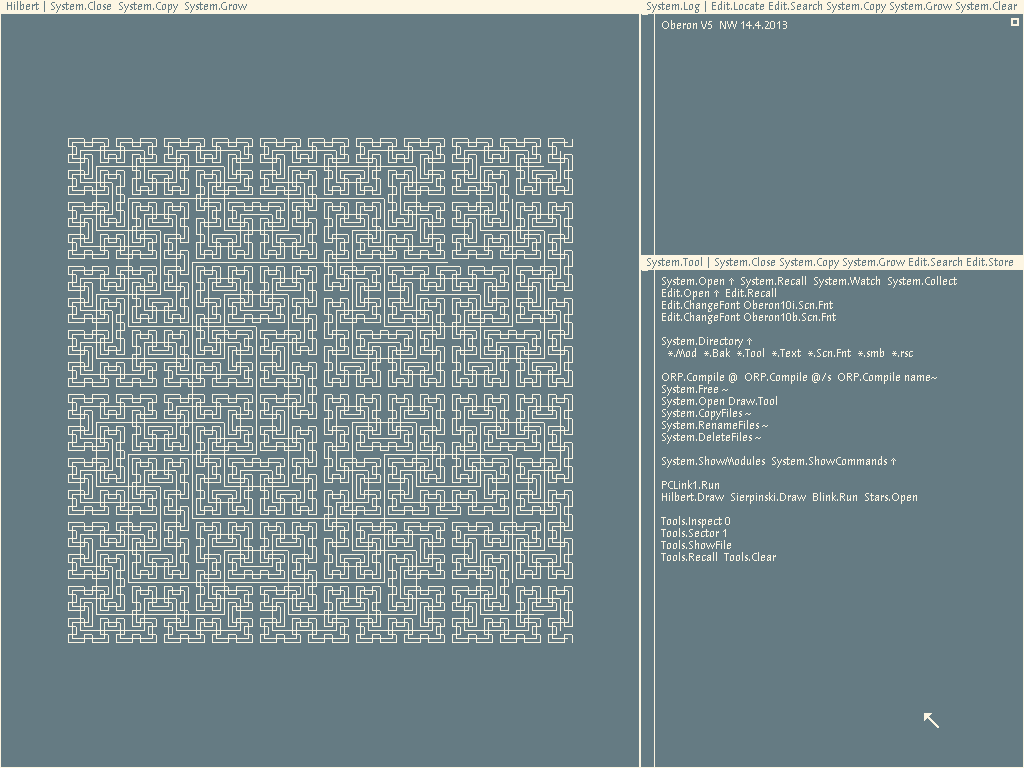Wirth's changelog:
20160704 - Display.Mod updated
guard against w < 0 in Display.ReplConst
20160620 - System.Mod updated (see procedure Clear)
20160601 - TextFrames.Mod.txt updated
see TextFrames.Extend WHILE ... & (curY >= botY) ...
20160508 - Oberon07.Report.pdf see syntax of module (";" removed)
see ORP.Declarations (OR (sym = ORB.return))
20160501 - Oberon07.Report.pdf see defintion of Type
20160418 - corrections: ORP.Mod.txt ORG.Mod.txt
|
||
|---|---|---|
| DiskImage | ||
| Mods | ||
| src | ||
| tools | ||
| .gitignore | ||
| Makefile | ||
| pcreceive.sh | ||
| pcsend.sh | ||
| po2013.png | ||
| README.md | ||
Oberon RISC Emulator
This is an emulator for the Oberon RISC machine. For more information, see Niklaus Wirth's site. For newcomers to the Oberon family of operating systems, the document Using Oberon in the Project Oberon section is a must-read.
Building
To build the emulator, you need the SDL2 library and a C compiler that understands C99 (GCC and clang are fine).
Linux
To install the needed packages on Debian, Ubuntu and derived distributions, use this command:
sudo apt-get install build-essential libsdl2-dev
See your distribution's documentation if you're using something else.
After that, build the emulator using the command make.
OS X
I can't give much support for OS X, but I've had many reports saying it works fine. The main stumbling block seems to be that there are two ways to install the SDL development files: Unix style and Xcode style, as explained in the SDL Mac OS X FAQ.
For Unix style, build using the command make.
For Xcode style, use make osx.
Windows
There's a pre-compiled version in Github's Releases section.
See the SDL site for how to set up a compiler for Windows. It's fiddly.
Alternatively, you can set up a cross compiler from Linux, which is also rather fiddle, and build with a command such as: (This is mostly for my own future reference.)
make CC=i686-w64-mingw32-gcc-win32 \
SDL2_CONFIG=/usr/local/cross-tools/i686-w64-mingw32/bin/sdl2-config
Disk image
You can find an up-to-date disk image in the DiskImage/ directory. These images contain a full Project Oberon 2013 system, with all source code, symbol files, etc.
They also have a few tweaks for better integration with the emulator (though it should still work fine on real hardware):
-
The Display module supports variable display resolution. (The original module was hardcoded for 1024x768.)
-
There's a Clipboard module for basic clipboard integration, documented below.
The source code for these modifications can be found in the Mods/ directory. The tools to generate the disk image exist in the Project Norebo repository.
Command line options
Usage: risc [options] disk-image.dsk
--fullscreenStart the emulator in fullscreen mode.--size <width>x<height>Use a non-standard window size.--serial-fd <fd>Send serial I/O to file descriptor fd (input) and fd+1 (output). (You probably won't need this.)
Keyboard and mouse
The Oberon system assumes you use a US keyboard layout and a three button mouse. You can use the left alt key to emulate a middle click.
The following keys are available:
Alt-F4Quit the emulator.F11orShift-Command-FToggle fullscreen mode.F12Soft-reset the Oberon machine.
Transferring files
First start the PCLink1 task by middle-clicking on the PCLink1.Run command. Transfer files using the pcreceive.sh and pcsend.sh scripts.
Alternatively, use the clipboard integration to exchange text.
Clipboard integration
The Clipboard module provides access to the host operating system's clipboard using these commands:
Clipboard.PasteClipboard.CopySelectionClipboard.CopyViewer
Known issues
- The wireless network interface is not emulated.
- Proper documentation is needed.
Copyright
Copyright © 2014 Peter De Wachter
Permission to use, copy, modify, and/or distribute this software for any purpose with or without fee is hereby granted, provided that the above copyright notice and this permission notice appear in all copies.
THE SOFTWARE IS PROVIDED "AS IS" AND THE AUTHOR DISCLAIMS ALL WARRANTIES WITH REGARD TO THIS SOFTWARE INCLUDING ALL IMPLIED WARRANTIES OF MERCHANTABILITY AND FITNESS. IN NO EVENT SHALL THE AUTHOR BE LIABLE FOR ANY SPECIAL, DIRECT, INDIRECT, OR CONSEQUENTIAL DAMAGES OR ANY DAMAGES WHATSOEVER RESULTING FROM LOSS OF USE, DATA OR PROFITS, WHETHER IN AN ACTION OF CONTRACT, NEGLIGENCE OR OTHER TORTIOUS ACTION, ARISING OUT OF OR IN CONNECTION WITH THE USE OR PERFORMANCE OF THIS SOFTWARE.
